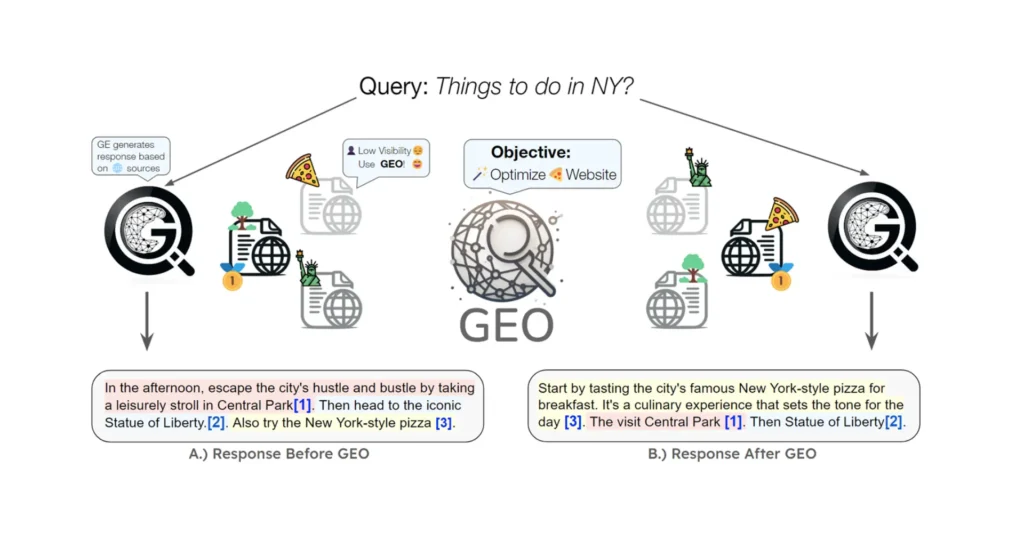The ground beneath the world of digital search is in motion. For years, we all learned the rules of a familiar game: Search Engine Optimization (SEO). It was a system of keywords, backlinks, and technical wizardry designed to win a coveted spot on a list of blue links. We all got good at it. But what happens when the game itself changes? What happens when the search engine decides to answer directly? Well, we are about to find out.
A new era of search is upon us, powered by artificial intelligence. This new paradigm requires a new approach, philosophy, and acronym: GEO, or Generative Engine Optimization. It’s a profound shift in how we think about content, authority, and our audience’s needs. The old playbook, while valuable, needs a new chapter. Let’s explore this future and how you can prepare for it.
What is GEO, and How Is It Different from Traditional SEO?
Generative Engine Optimization is the practice of readying your content to be the source material for AI-driven search results. Think about it this way: traditional SEO aims to rank your webpage so a user clicks it. GEO seeks to have the AI engine select your content, synthesize it, and present it directly to the user in a conversational summary. It’s the difference between being a destination and the source of truth.
Traditional SEO leans heavily on signals like keyword density, domain authority, and the quantity of backlinks. It is a competition for visibility on a results page. GEO, on the other hand, is a competition for influence over the AI’s answer. It values clarity, factual accuracy, demonstrated expertise, and a structure that an AI can easily parse and understand. You’re not just trying to please an algorithm that ranks links; you’re trying to inform a generative model that constructs answers.

How Google SGE (Search Generative Experience) Works
Google’s Search Generative Experience, or SGE, is the primary driver of this new reality. When a user types a query, especially a complex or conversational one, SGE kicks in. Instead of just presenting a list of websites, Google’s advanced AI models review information from multiple high-quality web sources. The system then composes a coherent, comprehensive answer, which is presented in a special panel at the top of the results page. This is the “AI snapshot.”
This snapshot often includes citations or links to its sources, which is good news for content creators. The AI’s job is to deliver a satisfying answer without the need for multiple clicks. For your content to be part of this snapshot, the AI must see it as authoritative, trustworthy, and directly relevant to the user’s query. It’s a whole new level of competition.
Why GEO Is the Future of Search Optimization in 2025
The reason GEO is the future is simple: user behavior. People want answers, and they want them fast. The AI-powered search experience gives them precisely what they want—a direct response. As users grow accustomed to this convenience, their tolerance for sifting through pages of links will diminish. Websites that fail to adapt will see their organic traffic decline. The click-through rate for the top organic positions will likely decrease, as the AI snapshot will satisfy many user queries upfront.
Therefore, the only viable path forward is to play the new game. The future of organic traffic depends on your ability to appear within these AI-generated results. Success in 2025 and beyond will be defined by your content’s utility as a source for these generative engines. It’s a fundamental change to the search ecosystem.
Key Components of Generative Engine Optimization
To succeed with GEO, you need to understand its core pillars. These components work together to signal your content’s value to AI systems.
- Conversational Query Optimization: People talk to generative AI. They ask full questions. Your content needs to address these conversational queries directly. Think in terms of questions and answers.
- Entity-Based Optimization: Search engines understand concepts, or “entities”—people, places, and things—and their relationships. A strong GEO strategy connects your content to a well-defined network of entities, establishing its topical relevance.
- Advanced Schema Markup: Structured data, or schema markup, is a vocabulary you add to your website to help search engines understand your content’s context. The schema for FAQs, how-tos, and author information is incredibly valuable for GEO.
- Content Depth and Comprehensiveness: Superficial articles will struggle. AI engines will look for content that covers a topic thoroughly, answers follow-up questions, and provides genuine insight.
- Demonstrated Authority: The engine needs to trust you. This comes from clear authorship, citations, evidence of expertise, and positive brand mentions across the web.

How to Optimize Content for AI-Powered Search Engines
Optimizing for an AI requires a specific mindset. First, write with absolute clarity. Use simple language, short sentences, and a logical structure. Headings, lists, and tables help an AI parse your information. Second, answer questions explicitly. Use a question as a subheading and provide the answer directly below it. This format is very friendly to generative models.
Third, build topical authority. Instead of writing one article on a subject, create a cluster of interconnected content that covers the topic from every angle. This signals to the AI that you are a comprehensive resource. Finally, support your claims. Link out to authoritative sources. Cite data—reference studies. Show the AI that your information is well-researched and trustworthy.
Role of E-E-A-T in Generative Engine Optimization
Google’s concept of E-E-A-T—Experience, Expertise, Authoritativeness, and Trustworthiness—becomes supremely important in the age of GEO. An AI model has a huge responsibility to provide accurate and safe information. It will preferentially select sources that demonstrate these qualities.
- Experience: Show you have real, first-hand experience with your topic. Author bios, case studies, and personal anecdotes can demonstrate this.
- Expertise: Display your credentials. Author qualifications, awards, and publications build a case for your expertise.
- Authoritativeness: Become the go-to source in your niche. When other authoritative sites link to you, it signals your content’s authority.
- Trustworthiness: Be transparent. Have clear contact information and a privacy policy, and secure your site with HTTPS. Positive reviews and a good reputation also contribute.

GEO Best Practices: What You Should Do in 2025
To put this all into action, here are some concrete best practices for your 2025 GEO strategy.
- Prioritize long-form, comprehensive content. Go deep on your topics.
- Structure content around conversational questions. Use tools to find out what your audience asks.
- Implement detailed schema markup. Use the FAQ, Article, and Person schema extensively.
- Build your authors’ public profiles. Connect your content to real, credible experts.
- Get your technical SEO in order. Site speed and mobile-friendliness still matter a great deal.
- Cultivate a strong internal link structure. Guide both users and crawlers through your topical clusters.
Tools & Technologies to Support Your GEO Strategy
A few categories of tools can assist your GEO efforts. AI content tools can help you brainstorm conversational queries and outline comprehensive articles. Schema generators can help you create the structured data you need without manual coding. Advanced SEO platforms also develop features to track your content’s performance within AI snapshots and other generative results. Look for tools that offer SERP feature analysis and entity-based keyword research.

Real-World Examples of Brands Succeeding with GEO
We can already see early examples of GEO’s impact. A cooking website that clearly lists ingredient substitutions in a structured format may pull its answer directly into an AI snapshot for a query like, “What can I use instead of buttermilk in a recipe?” A financial planning blog with articles authored by a certified financial planner may become the primary source for answering complex retirement savings questions. These brands succeed because they provide clear, authoritative, and well-structured answers to common user problems. They have made their content indispensable to the AI.
Preparing for the AI-Driven Search Revolution
The transition from traditional SEO to a GEO-centric approach is a marathon, a long-distance race. The core principles of good marketing remain the same: understand your audience and provide value. What has changed is the delivery mechanism. The future of search belongs to the creators who can package their expertise in a way a generative AI can understand, trust, and amplify. The revolution is here. Your preparation should start today.


